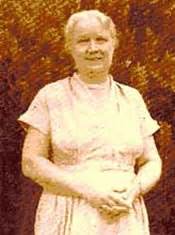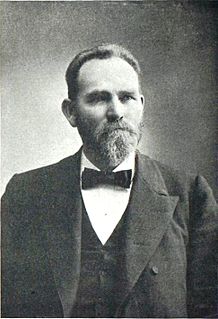A Quote by Hannah Hurnard
The heart knoweth its own sorrow and there are times when, like David, it is comforting to think that our tears are put in a bottle and not one of them forgotten by the one who leads us in paths of sorrow.
Related Quotes
It is abundantly evident that, however natural it may be for us to feel sorrow at the death of our relatives, that sorrow is an error and an evil, and we ought to overcome it. There is no need to sorrow for them, for they have passed into a far wider and happier life. If we sorrow for our own fancied separation from them, we are in the first place weeping over an illusion, for in truth they are not separated from us; and secondly, we are acting selfishly, because we are thinking more of our own apparent loss than of their great and real gain.
We mourn; we sorrow for our loved ones that go - our wives, our husbands, our children, our parents; we sorrow for them; and it is well and proper that we should moum for them and shed tears for the loss, for it is our loss; but it is their gain, for it is in the march of progress, advancement and development. It will be all right when our time comes, when we have finished our work and accomplished what the Lord required of us.
Recently, one friend asked me, "How can I force myself to smile when I am filled with sorrow? It isn't natural." I told her she must be able to smile to her sorrow, because we are more than our sorrow. A human being is like a television set with millions of channels. If we turn the Buddha on, we are the Buddha. If we turn sorrow on then we are sorrow. If we turn a smile on, we really are the smile. We can not let just one channel dominate us. We have the seed of everything in us, and we have to seize the situation in our hand, to recover our own sovereignty.
Repentance out of mere fear is really sorrow for the consequences of sin, sorrow over the danger of sin — it bends the will away from sin, but the heart still clings. But repentance out of conviction over mercy is really sorrow over sin, sorrow over the grievousness of sin — it melts the heart away from sin. It makes the sin itself disgusting to us, so it loses its attractive power over us. We say, ‘this disgusting thing is an affront to the one who died for me. I’m continuing to stab him with it!’
Behind joy and laughter there may be a temperament, coarse, hard and callous. But behind sorrow there is always sorrow. Pain, unlike pleasure, wears no mask. ... For this reason there is no truth comparable to sorrow. There are times when sorrow seems to me to be the only truth. Other things may be illusions of the eye or the appetite, made to blind the one and cloy the other, but out of sorrow have the worlds been built, and at the birth of a child or a star there is pain.
As we look upon that agony and those tearful prayers, let us not only look with thankfulness; but let that kneeling Saviour teach us that in prayer alone can we be forearmed against our lesser sorrows; that strength to bear flows into the heart that is opened in supplication; and that a sorrow which we are made able to endure is more truly conquered than a sorrow which we avoid
The difference between shallow happiness and a deep, sustaining joy is sorrow. Happiness lives where sorrow is not. When sorrow arrives, happiness dies. It can't stand pain. Joy, on the other hand, rises from sorrow and therefore can withstand all grief. Joy, by the grace of God, is the transfiguration of suffering into endurance, and of endurance into character, and of character into hope--and the hope that has become our joy does not (as happiness must for those who depend up on it) disappoint us.



































